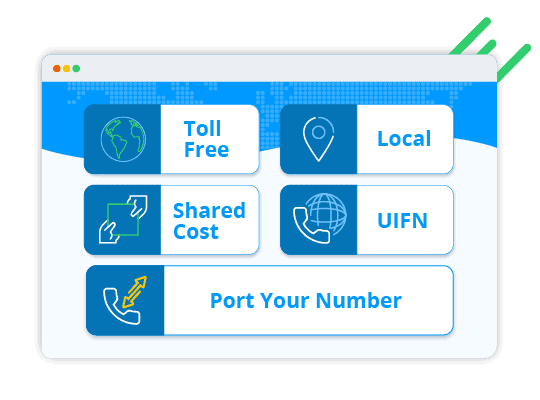Uganda Virtual Phone Numbers
Uganda Virtual Phone Numbers
Uganda virtual numbers allow you to take and make calls from anywhere. Buy an Uganda phone number online and start managing calls in minutes!
Buy Uganda Phone Numbers Online, Risk-Free

Get Reliable Uganda Virtual Numbers for Business Today
Uganda virtual phone numbers, also known as VoIP numbers, are real phone numbers with business features built-in. Manage your numbers from AVOXI's intuitive web-based interface or route our voice services through your existing phone system setup.
Get virtual numbers in Uganda with no setup fees or minimum contracts. Try Uganda VoIP services risk-free today!
Common Questions About Uganda Virtual Numbers
When you purchase an Uganda virtual number in the online shopping cart, your new business number is set up and activated within 30 minutes or less. If your business email does not match your listed company, an AVOXI expert may reach out to confirm your account details before unblocking the number.
To use our services with existing virtual numbers in Uganda, simply transfer your VoIP phone numbers to AVOXI. Porting Uganda virtual telephone numbers is a simple process.
Yes, if you are using an AVOXI number designated as TrueLocal. These numbers are guaranteed to work as your outbound caller ID and can be found listed in our online shopping cart.
Yes! AVOXI SIP trunking is a perfect alternative to Uganda Calling Plans in Teams. Our built-in, Microsoft-approved SBC solution makes configuration in Teams quick and easy.
In addition to the best Uganda virtual phone number services for business, popular solutions from AVOXI include International VoIP Numbers, Virtual Contact Centers, and Global SIP Trunking.
Virtual Phone Numbers as a Gateway to Uganda's Business Market
Executive Summary
Uganda represents a significant opportunity for international businesses, with its growing middle class, rising digital adoption, and strategic position in East Africa. This guide explores how virtual phone numbers can serve as a cost-effective entry point into the Ugandan market, enabling businesses to establish a local presence while minimizing initial investment risks.
Market Overview
Uganda's Business Landscape
Uganda's economy has demonstrated remarkable resilience, maintaining steady growth despite global challenges. The country boasts an annual GDP growth averaging 5.5%, complemented by a mobile penetration rate that now exceeds 70%. A burgeoning urban middle class, particularly in Kampala and regional centers, drives consumer spending and business opportunities. The widespread adoption of digital payment solutions further enhances the business environment, while Uganda's strategic position serves as an ideal gateway to East African markets.
Communication Infrastructure
The telecommunications sector in Uganda has undergone significant modernization in recent years. Urban areas now enjoy robust 4G coverage, supported by an expanding fiber optic network. Business communications predominantly rely on mobile phone usage, reflecting the country's leapfrogging of traditional telecommunications infrastructure. The increasing adoption of digital business solutions signals a market ready for innovative communication approaches.
Virtual Numbers in Market Entry Strategy
Strategic Advantages
Virtual phone numbers represent more than just a communication tool; they're a strategic asset for market entry. Companies can establish a local presence without investing in physical office space, allowing them to test market receptiveness before making significant investments. This approach builds trust through a local point of contact while maintaining the flexibility to scale operations based on market response. Organizations can project a professional image while operating remotely, creating a foundation for sustainable growth.
Integration with Business Operations
Successful implementation requires careful alignment with several key business functions. The virtual number system must integrate seamlessly with customer service strategy and sales and marketing initiatives. Companies need to consider local business hours and customs in their operational planning, while respecting cultural communication preferences. This integration should support broader digital transformation goals while maintaining operational efficiency.
Industry-Specific Applications
Technology Sector
The technology sector stands to benefit significantly from virtual number implementation. Software companies can provide local technical support without maintaining physical offices, while SaaS providers can offer region-specific customer service that enhances user experience. Fintech firms can establish trust through local presence, critical in financial services. Technology consultancies can effectively manage client relationships remotely while maintaining a local touch point.
Retail and E-commerce
In retail and e-commerce, virtual numbers facilitate comprehensive customer support throughout the purchase journey. Companies can provide seamless customer service for online shoppers, manage order tracking and fulfillment support, and coordinate local returns and logistics. Marketing campaigns benefit from dedicated tracking numbers that measure response rates and effectiveness.
Professional Services
Professional service firms can leverage virtual numbers to expand their market reach. Law firms can offer initial consultations and maintain client communications, while accounting services can coordinate effectively with local clients. Management consultants can nurture client relationships remotely, and real estate firms can handle property inquiries professionally while maintaining a local presence.
Addressing Common Concerns
Quality and Reliability
Modern VoIP infrastructure ensures consistent call quality across networks. Redundant systems prevent service interruptions, while partnerships with local telecom providers guarantee reliable connectivity. Regular system monitoring and maintenance ensure optimal performance, addressing common concerns about virtual communication reliability.
Cultural Considerations
Understanding Ugandan business culture is crucial for success. The market shows a strong preference for voice communication in business dealings, emphasizing the importance of personal relationships. Companies must consider the need for local language support and align their operations with local business customs to build trust and credibility.
Regulatory Compliance
Companies must navigate various regulatory requirements when establishing virtual numbers. This includes proper registration of business numbers, adherence to data protection and privacy regulations, and compliance with consumer protection requirements. Industry-specific regulations may also apply, requiring careful attention to compliance frameworks.
Implementation Guide
Phase 1: Preparation
The preparation phase begins with comprehensive market research and target audience definition. This leads to developing a detailed communication strategy and selecting an appropriate virtual number provider. Technical infrastructure setup follows, creating the foundation for successful implementation.
Phase 2: Launch
Launch activities focus on thorough staff training and documentation of procedures. Companies must conduct extensive test calls and quality assurance measures, establish customer service protocols, and prepare marketing communications before going live.
Phase 3: Operations
Operational success depends on regular performance monitoring and customer feedback collection. Organizations should continuously optimize their service delivery and scale operations based on market demand and performance metrics.
Best Practices
Customer Service
Effective customer service in the Ugandan market requires consistent response times within local business hours. Organizations should offer multiple communication channels while maintaining consistent service quality across all touchpoints. Staff training in cultural awareness ensures appropriate interaction with local customers.
Technical Setup
Technical implementation requires robust call routing systems supported by reliable backup infrastructure. Regular monitoring of call quality and system maintenance ensures consistent service delivery and customer satisfaction.
Business Development
Successful business development relies on careful tracking of ROI metrics and continuous gathering of market intelligence. Organizations should remain flexible, adjusting their strategy based on feedback and scaling operations in response to market opportunities.
Next Steps
A successful implementation begins with conducting detailed market analysis, followed by defining specific service requirements. Organizations must then select an appropriate virtual number provider and develop a realistic implementation timeline. This leads to preparing necessary budgets and resources, culminating in beginning the phased implementation process.
Conclusion
Virtual phone numbers offer a strategic entry point into Uganda's growing market. When implemented thoughtfully, they provide a cost-effective way to establish presence, build relationships, and scale operations based on market response. Success requires attention to cultural nuances, technical reliability, and strategic alignment with business objectives.























